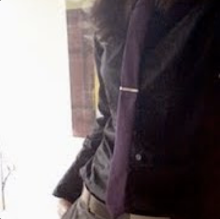
A quick, nerd-fun piece I wrote for a theater-related class. (Somebody else's class, yes. Full disclosure: I was doing someone's homework for them.) The assignment was to write a brief dialoge between two characters to demonstrate two perspectives on the question "Was Angels In America a tragedy in the classic sense?".
Scene: The kitchen of a Dunkin Donuts; 5am. Coworkers Brad (26 years old) and Jim (49 years old) are starting to make the donuts. They have had a one night stand with each other the night before and after a brief bit of awkwardness, are now happily slinging dough and intellectualizing.
JIM: (Pouring a flour like substance into an industrial sized mixer) I don’t know Brad. I think the only thing tragic about
Angels In America was the reality of Roy Cohn’s politics. I mean, …haven’t you ever read a history book? That man was an asshole- plain and simple. Ethel Rosenberg being executed and Cohn playing a huge part in that…now THAT’S a tragedy.
BRAD: (Has elbows on the steel industrial table in front of him , chin in his hands. He rolls his eyes, stands up and grabs a baking sheet) I’m talking “tragic” like in a classical sense, Jimbo. Think about it: Human fallibility, mortality, death, dying…it’s all in there. Roy Cohn is an example of all these things: He has all the power and connections in the world, he boasts that he can have the president’s wife on the phone with the snap of his fingers: but that’s not going to save his ass from dying of AIDS. He can call it cancer, he can threaten his doctor, can have access to all the AZT in the world but, in the end, he’s just another man who is going to die of AIDS.
(A pause.)
JIM: (Playfully throws some flour at Brad to break up the seriousness. Some flour gets on Brad’s nose) What would you know about the era this play was written in, anyway? You were, what...an ultrasound at that point? (Laughs to himself, pauses, then suddenly becomes serious, himself.) For me, it’s different. I was a 30 year old man living in New York when this play came out. Up until a year prior, with the whole Magic Johnson thing, people just talked about AIDS as a “gay disease”. And because of that, there was no mainstream dialogue about what was happening in the gay community because no one
cared. This play gave voice to a point in the 80s when no one knew what was happening: Gay men were dying left and right and no one knew
why.
THAT’S “tragedy”. This play? It was inspiring. Igniting. It started that absent mainstream discussion. Not just of AIDS, but also of the complexity of relationships -gay and straight alike. Sure…there was death and people facing their own mortality, but what play doesn’t have that? We’re human. We
die.
BRAD: (Beginning to stuff a pastry funnel into a donut to squeeze filling into it): Well, tragedy doesn’t necessarily have to involve a literal death, you know. I mean, Aristotle described tragedy as being the downfall of a well meaning hero more or less. Look at Louis, for example. He’s a tragic character. He loves Prior. He means well. On some moral level he wants to be able to stay with Prior but, in the end, he doesn’t. He can’t. And so, he fails. No matter what we as the audience want, or what he as a human with guiding principles wants- he fails. (Tosses a donut to Jim, who catches it.) You know who didn’t fail last night, though? (Smiles slowly, in a flirty fashion). You. When we read Jean Genet’s play
The Maids out loud to each other. (Wiggles eyebrows)
JIM: (coming towards Brad, putting the donut he has just caught up to Brad’s mouth) Oh, yeah? (Pushing his body up to Brad’s).
BRAD: (Pushing closer to Jim) Yeah…
JIM: (Shoving the donut into Brads mouth to Brad’s surprise) Well,
bite me. (Smirks. Walks past Brad and pushes open the two steel doors that lead out to the front counter of the store).
(end scene)
I'll leave you with a clip from Genet's The Maids. I just read an article about him and how he would protest his plays (The Balcony, in particular) being produced by most directors because they weren't performed in as perverse and disgusting a style in which he intended and would get taken out of the theaters by the cops. Gotta love him.
Keep in mind that these two female characters were written by Genet with the intention that they should be played by men playing women; watch from 1:11-1:44.
The Maids/Jean Genet.
And with t
hat a good, good night.
K.
photo credit: This is a still from Rainer Werner Fassbinder's (film) version of "Querelle" written by Jean Genet.
 Although I knew that they had brought in some of the pieces he had written, I never realized how heavily his art was used as an attempt to create a case against him. There's an entire section of the cross examination of the first trial that focuses strictly on Wilde's writing, and they go through everything: novels, plays, letters... entire segments and even single phrases are interrogated.
Although I knew that they had brought in some of the pieces he had written, I never realized how heavily his art was used as an attempt to create a case against him. There's an entire section of the cross examination of the first trial that focuses strictly on Wilde's writing, and they go through everything: novels, plays, letters... entire segments and even single phrases are interrogated.


